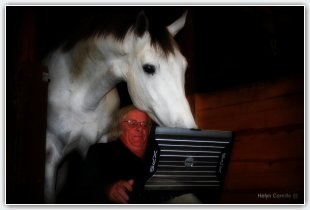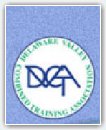|
Drowning The Fish
Issue No.2 |
|
Susan Hopf
Reviews "The Practical Application of the most recent discoveries on the biomechanics of the horses vertebral column."
This book pulled me in right from the beginning.
"Equestrian Education and veterinary approaches regard the horse's vertebral column as secondary to the legs. Principles of riding emphasize flexing the horse's spine through greater engagement of the hind legs and/or lowering of the neck. In the line of thought that back soreness is only the compensation for hock pain, equine practitioners are treating back pain by injecting the hocks."
And from then on I found that The Science of Motion (and Jean Luc Cornille) has presented a greatly advanced text with regard to the movement of the equine spinal column, rider influence on such and how to bring the two together to produce true balance and harmony.
Click here to read on.
|

|
|

Science Of Motion DVD's
A gifted horse will lead a good rider to victory. A great rider will give to the horse the gift of soundness. Jean Luc Cornille |
|
|
Chazot's Thoughts IV
Jean Luc Cornille
 Science allows us to look at natural processes with a different eye and to understand how things work, (Marc Kaufman) Science allows us to look at natural processes with a different eye and to understand how things work, (Marc Kaufman)
Tonight I came back from my training session feeling simultaneously good and tired. I held my neck outside of my stall, but I was not really looking outside. I was looking inside myself thinking about my body. Manchester asked, hard work? I told him not really; we stayed at the walk the entire training session. Manchester immediately asked; something wrong? Usually he does that when he wants you to work very specific muscles groups. I confessed that yesterday, as I was rolling energetically in the sand I overdid and I did not feel very comfortable for the rest of the day. That evening I was glad that he did not ask too much. We started at the trot and he noticed that when he was changing the diagonal of his rising trot, I protected myself for a few strides. I don't think that I was lame but I was cautious. He walked, let me rest and asked for a few longitudinal and lateral flexions. He then stopped thinking you hurt yourself again. His mind was on a quote that he feels does fit me very well. "Experience enables you to recognize a mistake when you make it again." (Franklin P. Jones)
Manchester added, as if he could read my mind, and today you did the whole training session at the walk. And tonight you feel like your whole body has been worked intensively. I wondered how he knew all that but then he told me. When I first started my reeducation, I stayed two months at the walk. I had been submitted to numerous therapies but once set in motion I did what we are all doing instinctively, I protected my problem. I sheltered my left stifle extending my left hind limb without using my knee extensors. I have done that since day one and this is why not one of the previous approaches ever reached my problem. My protective reflex mechanism did not fool him. He knows that we can execute exactly the same movement using different muscle groups. In fact, talking about my left stifle I can feel that he was thinking about a study that he had read earlier on. He had a sentence in his mind. If I remember right, it was something like, "A visually identical hind limb extension in late stance may be accomplished by only hip extensor muscles, only knee extensor muscles or any combination of these." (Liduin S. Meershoek and Anton J. van den Bogert. Mechanical Analysis of Locomotion.) I guess, late stance means the end of the support phase since it is the moment where we are using these muscles. He played with my balance, slightly changed my body posture. He focused on the longitudinal flexion of my spine and I realized then that I was using my knee extensors. I stop immediately thinking, this is going to hurt, but it did not hurt, so I tried again. Little by little, my muscles became stronger and when he asked for the trot I was not too worried about it. He did not really ask me any specific movement. He does not think that repeating a movement can educate our body. He is right about that. For years I executed many movements without ever using my knee extensors muscles on the left side. My riders were focusing on neck posture and other details and meanwhile, I was executing the move protecting my problem. CLICK HERE TO READ ON |
|
CLINIC
Horse Gate Stables in Dixmont(Maine)
 Horse Gate Stables In Dixmont (Maine) Horse Gate Stables In Dixmont (Maine)
Performance Symposium with Jean Luc Cornille
Daily Lectures
In-Hand Demostration
Door Prize and drawing for free lesson
Lunch Included
Heated Indoor arena
Stabling availible
Sign up by Feb 17th
Clinic 3/12 to 3/13
Contact Stacia at stacia@stoneridgestables.net
Phone 207-564-3080
|
|
Lecture and Clinic with Jean Luc Cornille
 Lecture Lecture
Date: Friday, May 6th
Time: 7:00 pm
Place: New Bolton Center Woerner Amphitheater
Topic: Straightness Through the Practical Application of the Most Advanced Scientific Discoveries. Come learn about Volitional Education: learning through active participation of the horse's thought process, & the Plasticity of Muscles Function: the most advanced understanding of how the muscular system operates.
Fee: Only $10 for DVCTA members; $15 for non-members
Clinic
Dates: Saturday & Sunday, May 7th & 8th
Place: Happily Ever After Farm, 272 Brandywine Drive, West Chester, PA 19382
Fee: $175 for 1-hour private lesson
Auditors: $10 per day for DVCTA members, $15 for non DVCTA members.
DinnerDate: Saturday May 7thPlace: TBD Join Jean Luc for dinner. Space limited to 5 people.Fee: $12 + your dinner
Meet the Clinician:Through Jean Luc's extensively diversified and decorated equestrian career, he has become a master at equine performance analysis. Whether to simply improve the daily relationship between horse and rider or to prepare a horse for upper level performances, Jean Luc Cornille has garnered world-wide recognition for his ability to decipher and resolve the underlying cause of apparent physical inabilities or talent limitations. |
|
|